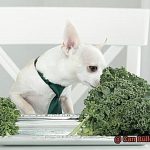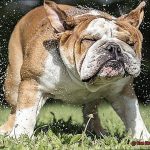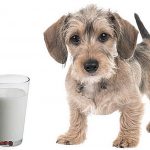Can bulldogs eat kidney beans?
Title: Bulldog’s Belly and the Bean Bonanza: Can Bulldogs Munch on Kidney Beans?
Introduction:
Contents
- 1 What Are Kidney Beans?
- 2 Are Kidney Beans Safe for Bulldogs?
- 3 The Potential Risk of Feeding Bulldogs Kidney Beans
- 4 How Much Kidney Bean Consumption Is Too Much?
- 5 Alternatives to Kidney Beans for Bulldogs
- 6 Creating a Balanced Diet Plan for Your Bulldog
- 7 Signs of Gastrointestinal Distress in Bulldogs
- 8 Consulting with a Professional Nutritionist or Veterinarian
- 9 Conclusion
Hey there, fellow pet enthusiasts. If you’ve ever owned a bulldog, you’ll agree that these lovable goofballs are always ready to chow down on anything in sight. As responsible guardians, we’re constantly pondering whether certain foods are safe for our four-legged pals. Today, we embark on a culinary adventure to unravel the tantalizing mystery of whether bulldogs can safely indulge in kidney beans.
Now, picture this: plump little legumes bursting with protein, fiber, and an array of essential minerals. They’re a beloved addition to many human diets. But can our bulldogs join the bean party or should we keep their bowls bean-free? In this captivating blog post, we’ll dive deep into the potential benefits and risks of feeding kidney beans to bulldogs. Get ready for some eye-opening insights into the world of beans and bulldogs that you never knew you needed.
So grab your favorite beverage and let’s delve into the belly-rumbling conundrum of bulldogs and kidney beans.
What Are Kidney Beans?
While kidney beans may be a staple in your own diet, it’s important to understand that some foods that are safe for us humans may not be safe for our four-legged companions. In this blog post, we will explore the characteristics and potential health benefits of kidney beans for humans, as well as the reasons why they should be avoided when it comes to feeding bulldogs.
Characteristics of Kidney Beans:
Kidney beans, as the name suggests, are legumes that have a distinct kidney shape and reddish-brown color. They are commonly used in various cuisines around the world, adding flavor and texture to dishes like chili, soups, and salads. Kidney beans are packed with nutrients and offer several health benefits when consumed by humans.
Health Benefits of Kidney Beans for Humans:
- Plant-Based Protein: Kidney beans are an excellent source of plant-based protein, making them a valuable addition to vegetarian or meat-reducing diets.
- Fiber-Rich: These beans are high in fiber, which aids in digestion and promotes a healthy gut.
- Nutrient Powerhouse: Kidney beans contain essential vitamins and minerals like folate, iron, magnesium, and potassium.
Why Bulldogs Should Avoid Kidney Beans:
While kidney beans offer numerous health benefits for humans, they can pose potential risks when it comes to feeding bulldogs. Bulldogs have specific dietary needs and sensitivities that differ from ours. Here’s why kidney beans should be avoided:
- Toxicity: Raw or undercooked kidney beans contain lectin phytohaemagglutinin, a naturally occurring toxin that can cause gastrointestinal distress if ingested by dogs.
- Digestive Sensitivities: Bulldogs are prone to flatulence and digestive problems. Foods like kidney beans, which may not be easily digestible for them, can exacerbate these issues.
- Harmful Compounds: Kidney beans also contain phytohemagglutinin, which can be harmful to dogs and lead to symptoms like nausea, vomiting, and kidney damage.
Consulting with a Veterinarian:
It is crucial to consult with a veterinarian before introducing any new food into your bulldog’s diet. They can provide professional guidance on whether it is safe to feed kidney beans to your furry friend and suggest appropriate portion sizes based on their specific needs.
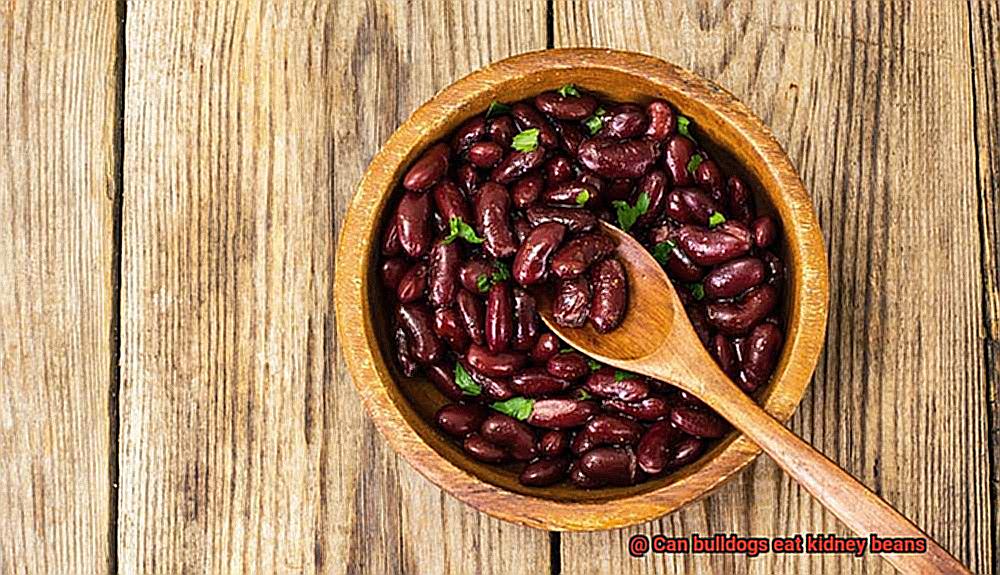
Are Kidney Beans Safe for Bulldogs?
If you’re a proud French Bulldog owner, you know how important it is to keep your furry friend’s health and well-being a top priority. And that includes being mindful of what they eat. One common question that often arises is whether kidney beans are safe for Bulldogs. In this blog post, we’ll explore the potential risks and precautions associated with feeding kidney beans to your beloved pup.
Understanding the Risks
Kidney beans, like other legumes, contain a substance called lectin. Lectins are proteins that can bind to the lining of the digestive tract, causing irritation and inflammation. In some cases, lectins can even be toxic to dogs. Raw kidney beans are particularly dangerous as they contain high levels of lectins that are not destroyed during the cooking process. Therefore, it is crucial to ensure that kidney beans are fully cooked before feeding them to your Bulldog.
Sensitive Stomachs and Allergies
Bulldogs are known for their sensitive stomachs and allergies. They can be prone to digestive issues, such as bloating, gas, or diarrhea. Introducing kidney beans into their diet may exacerbate these problems due to their high carbohydrate and fiber content. It is recommended to consult with your veterinarian before adding kidney beans to your Bulldog’s meals.
Consulting with a Veterinarian
Each dog is unique and may have different sensitivities or allergies. Consulting with a veterinarian is essential before making any changes to your Bulldog’s diet. They will be able to provide specific guidance based on your dog’s individual needs and help determine whether kidney beans are safe for them.
Introducing Kidney Beans in Small Quantities
If you decide to include kidney beans in your Bulldog’s diet, it’s best to start with small quantities and carefully monitor their reaction. Watch out for any signs of digestive distress or allergic reactions, such as vomiting, diarrhea, or skin irritations. If you notice any adverse effects, it’s crucial to discontinue feeding kidney beans immediately and seek veterinary advice.
The Potential Risk of Feeding Bulldogs Kidney Beans
We all want the best for our four-legged friends, especially when it comes to their diet. While kidney beans may be a staple in our own meals, it’s important to understand the potential risks they pose to our beloved bulldogs. In this blog post, we’ll dive into the potential hazards of feeding kidney beans to bulldogs and offer some tips on keeping your furry friend safe and healthy.
High Protein Content:
Protein is crucial for a dog’s diet, but a bulldog’s unique physiology makes them prone to certain health issues like kidney problems. Feeding excessive amounts of protein, such as that found in kidney beans, can put additional strain on their kidneys. So, it’s essential to moderate their protein intake and consult with a veterinarian to determine the right balance for your bulldog.
Lectin Sensitivity:
Lectins are compounds naturally present in legumes, including kidney beans. While lectins themselves aren’t harmful, some dogs may be sensitive to them. This sensitivity can lead to digestive issues or allergic reactions when consumed in large quantities. If you notice any adverse reactions after feeding kidney beans, it’s best to avoid them altogether and explore alternative protein sources.
Toxin Concerns:
Raw or undercooked kidney beans contain a compound called phytohaemagglutinin, which can be toxic to both humans and dogs if not properly cooked. Symptoms of toxicity include gastrointestinal upset like nausea, vomiting, and diarrhea. Always ensure that kidney beans are thoroughly cooked before introducing them into your bulldog’s diet.
Brachycephalic Anatomy:
Bulldogs have adorable flat faces, but this brachycephalic anatomy can pose challenges when it comes to chewing and digesting certain foods. The size and shape of kidney beans may present a choking hazard or even cause gastrointestinal blockages if not broken down properly during digestion. Consider mashing or pureeing kidney beans to make them easier for your bulldog to eat.
How Much Kidney Bean Consumption Is Too Much?
French Bulldogs are known for their adorable wrinkled faces and playful personalities. As responsible pet owners, it’s important to ensure that we are providing them with a balanced and nutritious diet. While kidney beans can be a healthy addition to their meals, it’s crucial to understand how much is too much for our furry friends.
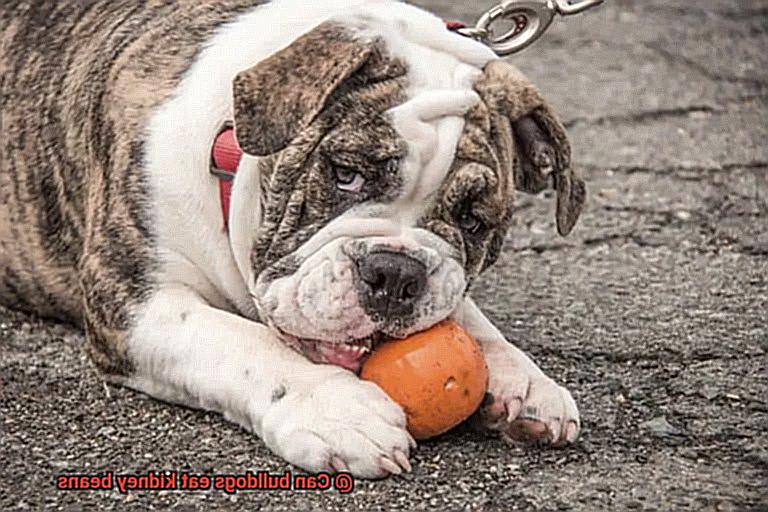
Introducing Kidney Beans Gradually
French Bulldogs have sensitive digestive systems, so it’s important to introduce kidney beans gradually into their diet. Start by offering a small amount of cooked kidney beans and monitor their reaction. Look out for any signs of stomach discomfort or diarrhea. If your bulldog experiences any digestive issues, it’s best to discontinue feeding kidney beans and consult with your veterinarian.
Reducing Lectin Content
One of the main concerns with feeding kidney beans to dogs is the presence of lectins. Lectins are proteins that can cause digestive issues and interfere with nutrient absorption. However, there’s good news. Soaking and cooking kidney beans can significantly reduce the lectin content, making them safer for consumption by bulldogs. Be sure to soak the beans overnight and cook them thoroughly before feeding them to your furry friend.
Watch Out for Sodium Levels
Canned kidney beans are a convenient option, but they often contain high levels of sodium. Bulldogs are prone to certain health issues, such as heart problems and high blood pressure, so it’s important to keep their sodium intake in check. Opt for low-sodium or no-salt-added canned kidney beans if you choose to feed them to your bulldog.
Consult with Your Veterinarian
As with any dietary changes, it’s always a good idea to consult with your veterinarian before adding kidney beans to your bulldog’s diet. They can provide personalized advice based on your dog’s specific needs and any existing health conditions they may have.
In conclusion, while kidney beans can be a nutritious addition to your French Bulldog’s diet, it’s crucial to be mindful of the quantity and preparation methods. Gradually introduce kidney beans, reduce lectin content through soaking and cooking, and opt for low-sodium varieties. Remember, consulting with your veterinarian is always the best course of action when it comes to your bulldog’s health.
Alternatives to Kidney Beans for Bulldogs
We all know how important it is to keep our furry friends healthy and happy. While kidney beans might seem like a nutritious option, did you know that they can actually be harmful to your bulldog’s health? That’s right. But don’t fret, because we’ve got some fantastic alternatives that will keep your pup wagging their tail with joy. Let’s dive into the world of legumes and discover the benefits they bring to your furry friend’s diet.
Chickpeas: The Protein Powerhouse
If you’re looking for a legume packed with protein, fiber, and vitamins, chickpeas are here to save the day. Not only are chickpeas safe for bulldogs, but they also provide essential nutrients to support their overall well-being. Whether you choose to serve them cooked or as part of a homemade dog food recipe, chickpeas will have your bulldog barking for more.
Lentils: Gentle on the Tummy
When it comes to digestive health, lentils are the MVPs. These little legumes are not only rich in protein and fiber but also gentle on your bulldog’s sensitive tummy. Cook up some lentils and add them to your bulldog’s regular meals or use them as a base for delicious homemade dog food recipes. Your furry friend will thank you with slobbery kisses.
Green Peas: Vitamins Galore

Who doesn’t love a tasty treat that’s also packed with vitamins? Green peas are the answer. They are bursting with vitamins A, C, and K, as well as fiber and antioxidants. Serve them cooked or raw as a healthy snack or mix them into your bulldog’s regular meals for an extra punch of nutrition. Watch those happy tails wag.
Black Beans: Protein and Fiber Combo
While moderation is key, black beans can be a fantastic addition to your bulldog’s diet. They provide a good source of protein and fiber, keeping your pup feeling full and satisfied. Cook them up, mash them, or add them to homemade dog food recipes – the possibilities are endless.
Remember:
When introducing any new food to your bulldog’s diet, take it slow and steady. Gradual changes help their tummies adjust and prevent any potential tummy troubles. And as always, consult with your veterinarian for personalized guidance based on your bulldog’s specific needs and health condition.
Creating a Balanced Diet Plan for Your Bulldog

When it comes to our beloved bulldogs, we want nothing but the best for them. And that starts with their diet. Bulldogs have unique dietary needs, so it’s crucial to create a balanced diet plan to ensure their overall health and well-being.
Protein Powerhouse
A bulldog’s diet should consist of high-quality protein sources. Lean meats like chicken or turkey are excellent choices as they provide essential amino acids that help in muscle development and maintenance. You can also consider alternative protein sources such as legumes – chickpeas, lentils, and green peas are legume superheroes packed with protein and other essential nutrients.
Healthy Fats for a Glossy Coat
Healthy fats are another important component of a bulldog’s diet. Sources like fish oil or flaxseed oil provide the necessary fatty acids that promote a healthy coat and skin, as well as support brain function. A shiny coat not only looks great but also indicates good overall health.
Carbohydrates Done Right
Carbohydrates are essential for bulldogs, but it’s important to choose complex sources like whole grains or vegetables. These provide sustained energy and necessary fiber. On the other hand, simple carbohydrates found in processed foods or sugary treats can lead to weight gain and other health issues – something we definitely want to avoid.
Portion Control is Key
Bulldogs have a tendency to overeat, so portion control is crucial. Dividing their daily food intake into two or three meals can prevent them from becoming overweight. This helps maintain a healthy body condition and prevents the development of obesity-related health problems.
Vitamin-Packed Fruits and Vegetables
Fresh fruits and vegetables are beneficial additions to your bulldog’s diet. They offer essential vitamins, minerals, and antioxidants that support overall health. However, some fruits and vegetables may be toxic to bulldogs, so make sure to research which ones are safe for them to consume.
Hydration is Vital
Water is essential for a bulldog’s overall health, especially since they tend to drool more than other breeds. Make sure to monitor their hydration levels closely and provide fresh water at all times. Keeping them hydrated supports proper bodily functions and prevents issues associated with dehydration.
Professional Guidance
It’s always advisable to consult with a veterinarian or professional canine nutritionist when creating a balanced diet plan for your bulldog. They can provide specific guidelines based on your dog’s age, weight, and any existing health conditions. Their expertise will ensure that your bulldog receives the exact nutrition they need for optimal health.
Watch Their Weight
Regularly monitoring your bulldog’s weight is essential. Maintaining a healthy body condition is crucial in preventing obesity-related health issues. If necessary, adjustments can be made to their diet plan to manage their weight effectively.
Signs of Gastrointestinal Distress in Bulldogs
French Bulldogs are known for their charming personalities and adorable wrinkled faces. But did you know that they are also prone to gastrointestinal issues? As a responsible bulldog owner, it’s essential to be aware of the signs of gastrointestinal distress, especially after your furry friend consumes certain foods like kidney beans. In this section, we’ll explore the common signs of gastrointestinal distress in bulldogs and what they might mean.
- Vomiting: One of the telltale signs that your bulldog is experiencing gastrointestinal distress after eating kidney beans is frequent or consistent vomiting. If you notice your furry friend throwing up shortly after consuming these beans, it may indicate that their digestive system cannot tolerate them.
- Diarrhea: Loose or watery stools are another sign of digestive upset in bulldogs. If your bulldog experiences diarrhea after indulging in kidney beans, it could suggest that their tummy is having trouble handling them.
- Flatulence: Bulldogs who have difficulty digesting kidney beans may experience excessive gas or bloating. If you notice your furry friend passing gas more frequently than usual, it could be a sign of gastrointestinal distress.
- Abdominal pain or discomfort: Keep an eye out for restlessness, pacing, or reluctance to lie down. These behaviors may indicate that your bulldog is experiencing abdominal pain or discomfort due to kidney bean consumption.
- Loss of appetite: Bulldogs who feel unwell after eating kidney beans may lose their appetite or show decreased interest in food. If your furry friend refuses to eat or seems disinterested in their regular meals, it could be a sign of gastrointestinal distress.
It’s important to note that while some bulldogs may be able to tolerate kidney beans without any issues, others may have sensitivities or allergies that cause gastrointestinal distress. Monitoring their reactions to new foods is crucial to avoid discomfort and potential health complications.
If your bulldog consistently exhibits any of these signs or experiences them for an extended period, it’s vital to seek veterinary attention. A professional can diagnose the issue and provide appropriate treatment to alleviate your furry friend’s discomfort.
Consulting with a Professional Nutritionist or Veterinarian
Bulldogs are known for their unique dietary needs, and understanding what foods are safe and healthy for them is vital. So, let’s dive in and discover why seeking expert advice is the paw-fect choice.
Expert Insights on Nutritional Requirements:
Professional nutritionists and veterinarians possess extensive knowledge of animal nutrition. They can assess your bulldog’s specific dietary needs based on factors like age, weight, activity level, and existing health conditions. Their expertise ensures that your furry friend receives a well-balanced diet.
Evaluating Kidney Beans’ Nutritional Content:
Consulting with professionals allows you to compare the nutritional content of kidney beans to your bulldog’s dietary requirements. They consider potential risks or allergies associated with kidney beans that may affect bulldogs specifically. This evaluation guarantees that your bulldog’s health and well-being are prioritized.
Proper Preparation and Serving Size:
Experts can guide you on how to prepare kidney beans for your bulldog’s consumption. They may recommend cooking the beans thoroughly to aid digestion. Additionally, they can advise on portion control to prevent overfeeding, which can lead to weight gain and other health issues in bulldogs.
Ongoing Monitoring and Adjustments:
Professionals closely monitor your bulldog’s response to kidney beans. They observe any changes in digestion, stool consistency, energy levels, or overall health. This ongoing monitoring ensures that kidney beans do not cause any adverse effects on your bulldog’s well-being.
Pre-Existing Health Conditions:
If your bulldog has pre-existing health conditions or follows a specialized diet, consulting with a professional is crucial. They can provide personalized recommendations based on your bulldog’s unique needs, ensuring that kidney beans will not aggravate any existing ailments.
cAQ2MQ1QdWc” >
Conclusion
In conclusion, it is not recommended to feed bulldogs kidney beans.
These legumes contain a substance called lectin, which can be harmful to dogs. Bulldogs have sensitive digestive systems and may struggle to properly digest kidney beans, leading to discomfort or even more serious health issues.
It’s important to prioritize the well-being of your furry friend and stick to a diet that is safe and suitable for their specific needs. Instead of kidney beans, consider offering your bulldog other dog-friendly protein sources such as lean meats or specially formulated dog food.
Always consult with your veterinarian before making any significant changes to your dog’s diet.

